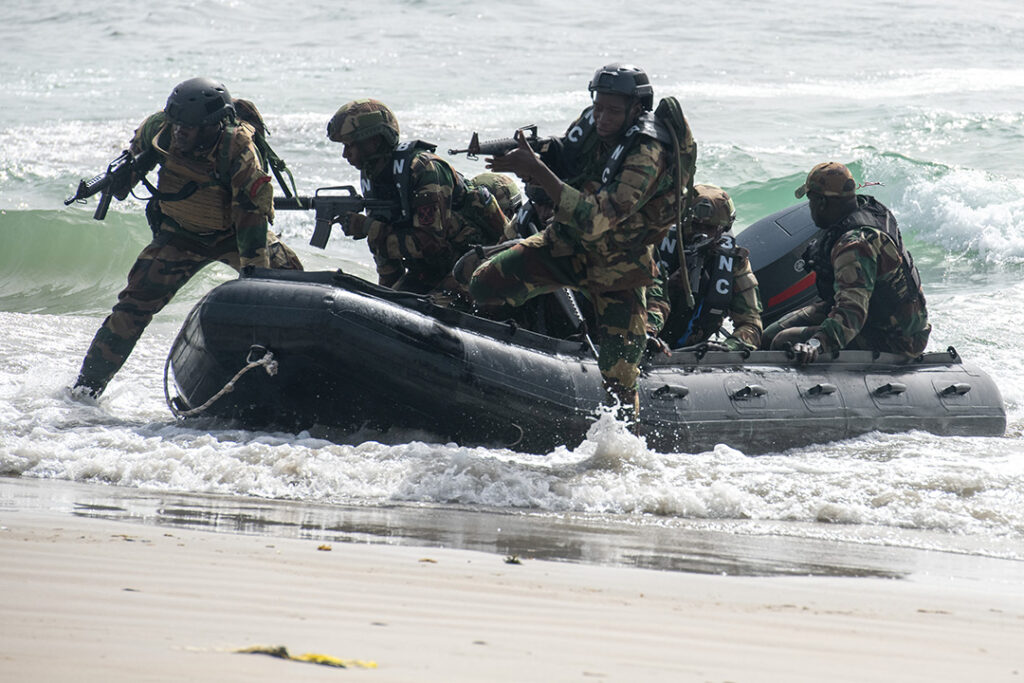Effective communication is key to ensuring the success of military training events such as Obangame Express 2025, the largest multinational maritime exercise in Western and Central Africa. The annual exercise aims to build cooperation among nations to fight sea crimes such as illegal fishing, piracy and trafficking.
This year’s two-week exercise, which ended May 16, included visit, board, search and seizure training in Senegal, where participants overcame language barriers to complete tasks. Gambian Sailors were lauded for their communications skills after stepping in as English, French and Portuguese interpreters while participants practiced tactical ship entries and learned search and evidence-handling procedures. Chief Petty Officer Mass Jallow of the Gambian Navy said the exercise was constructive for his team.
“We come from different countries, different training backgrounds,” Jallow said. “Sharing techniques and experiences gives us stronger ideas to take home.”
The boarding drills tested coordination among maritime operations centers, which help coordinate joint responses to maritime threats.
“Senegal was the right place for this,” Jallow said. “They have everything needed to make this training effective.”
Cabo Verde hosted the exercise, which stretched across five maritime zones from Angola to Senegal. The United States Sixth Fleet led the exercise, supported by U.S. Africa Command.
Throughout the exercise, militaries deployed more than 30 ships, multiple aircraft, and 21 Maritime Operations Centers to carry out training in real time with a focus on speed, coordination and shared responsibility. The exercise supports the Yaoundé Code of Conduct, which plays an increasingly important role in maintaining situational awareness and fighting maritime crime in the Gulf of Guinea, one of the world’s hottest spots for piracy, illegal fishing, drug trafficking and other sea crimes.
Exercise participants also practiced using SeaVision, a maritime domain awareness tool that lets users track commercial vessels globally with data from automatic identification system (AIS) transponders. SeaVision helps countries share maritime information and intelligence, enhance operational capabilities and detect vessels not transmitting an AIS signal, which is often a sign of illegal activity. About 25 African countries use the tool.
The exercise included a six-day rule of law exercise that aimed to improve interoperability in vessel boarding, evidence collection, case building and prosecution. Each participating nation provided a legal representative and maritime operators. The symposium featured multiple tabletop exercises and a mock trial where maritime operators testified about their findings. Participants also spoke of their respective maritime concerns.
“We are talking about illegal immigration, illegal fishing, unreported fishing, and also drug trafficking, which are threats to our waters,” Capt. Francisco Moreira, operations director of the Cabo Verdean Coast Guard, said in a news release. “Cabo Verde also invited all the national agencies that work together in these operations. I think that from now on, we will be better prepared for our missions.”
According to Moreira, the training offered his team tangible takeaways to help address Cabo Verdean threats.
“We will be better equipped in terms of knowledge, in terms of ideas, and, of course, we will put it into practice,” Moreira said. “Because of our geostrategic situations, we have to do it.”
African nations that participated in the exercise were: Angola, Benin, Cabo Verde, Cameroon, Cote d’Ivoire, the Democratic Republic of the Congo, Gabon, the Gambia, Ghana, Guinea-Bissau, Liberia, Morocco, Namibia, Nigeria, the Republic of the Congo, Sao Tome and Principe, Senegal, Sierra Leone and Togo.

